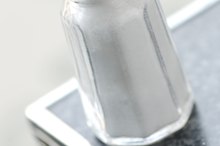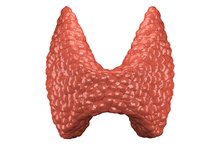What does fact checked mean?
At Healthfully, we strive to deliver objective content that is accurate and up-to-date. Our team periodically reviews articles in order to ensure content quality. The sources cited below consist of evidence from peer-reviewed journals, prominent medical organizations, academic associations, and government data.
The information contained on this site is for informational purposes only, and should not be used as a substitute for the advice of a professional health care provider. Please check with the appropriate physician regarding health questions and concerns. Although we strive to deliver accurate and up-to-date information, no guarantee to that effect is made.
Iodine & Shrimp
Seafood can provide many important vitamins and minerals, including iodine. Iodine is important for the health of your thyroid and can be found in shrimp. If you have an iodine deficiency, eating iodine-rich foods may help to keep your thyroid functioning properly. However, eating more shrimp will not correct hypothyroidism due to other causes.
What Is Iodine?
Iodine is a mineral that is primarily needed for the body to make thyroid hormone. Your thyroid gland makes two different hormones, known as T3 and T4, that help control the rate at which your body burns energy. Increased levels of thyroid hormone cause your cells to burn more energy and generate more heat. A lack of thyroid hormone can cause you to feel sluggish, intolerant to cold and makes your skin dry and pale.
- Iodine is a mineral that is primarily needed for the body to make thyroid hormone.
- Your thyroid gland makes two different hormones, known as T3 and T4, that help control the rate at which your body burns energy.
Iodine In Shrimp
Can I Eat Seaweed If I Have Hyperthyroidism?
Learn More
Shrimp are a relatively good source of dietary iodine. On average, 3 ounces of shrimp contain 25 micrograms of iodine. One of the reasons why shrimp and other seafood is so high in iodine is that they absorb some of the iodine that is naturally present in seawater, causing the iodine to accumulate in their bodies. Seaweed also is rich in iodine 3.
- Shrimp are a relatively good source of dietary iodine.
- One of the reasons why shrimp and other seafood is so high in iodine is that they absorb some of the iodine that is naturally present in seawater, causing the iodine to accumulate in their bodies.
Human Iodine Needs
If you do not get enough iodine, you will develop signs of hypothyroidism. Adolescents and adults need approximately 150 micrograms of iodine per day to keep their thyroid functioning properly. Children between the ages of 9 and 13 need 120 micrograms per day, and 90 micrograms per day is needed for children aged 1 through 8. Infants need more iodine than children, requiring 110 micrograms per day during the first six months of life and 130 micrograms per day for months 7 through 12.
- If you do not get enough iodine, you will develop signs of hypothyroidism.
- Children between the ages of 9 and 13 need 120 micrograms per day, and 90 micrograms per day is needed for children aged 1 through 8.
Considerations
Gout and Iodine
Learn More
Shrimp is an important food if you have an iodine deficiency, but deficiencies in this mineral are uncommon in the United States, as iodine is often added to table salt. Eating more iodine will not help you if you do not have an iodine deficiency, so talk to your doctor if you are concerned about an iodine deficiency. The maximum amount of iodine you should consume each day is 1,100 micrograms unless otherwise directed by your doctor.
Related Articles
References
- University of Maryland Medical Center: Iodine; Steven Ehrlich
- Linus Pauling Institute: Iodine; Jane Higdon
- Medline Plus: Iodine In Diet
- American Thyroid Association. Iodine Deficiency. 2020.
- Eastman CJ, Zimmermann MB. The iodine deficiency disorders. In: Feingold KR, Anawalt B, Boyce A, et al., editors. Endotext. South Dartmouth, MA: MDText.com, Inc. Updated February 6, 2018.
- Ahad F, Ganie SA. Iodine, Iodine metabolism and Iodine deficiency disorders revisited. Indian J Endocrinol Metab. 2010;14(1):13-17.
- Kostoglou-athanassiou I, Ntalles K. Hypothyroidism - new aspects of an old disease. Hippokratia. 2010;14(2):82-87.
- American Thyroid Association. Hypothyroidism in Children and Adolescents. 2020.
- National Institutes of Health, Office of Dietary Supplements. Iodine. Updated July 9, 2019.
- U.S. National Library of Medicine. Congenital hypothyroidism. Updated February 11, 2020.
- Johnson LE. Iodine. Merck Manual Professional Version. Updated October 2018.
- Murthy MB, Krishnamurthy B. Severe irritant contact dermatitis induced by povidone iodine solution. Indian J Pharmacol. 2009;41(4):199-200. doi:10.4103/0253-7613.56069
- Puchalski AR, Chopra IJ. Radioiodine treatment of differentiated thyroid cancer despite history of 'iodine allergy'. Endocrinol Diabetes Metab Case Rep. 2014;2014:130084. doi:10.1530/EDM-13-0084
- Schabelman E, Witting M. The relationship of radiocontrast, iodine, and seafood allergies: a medical myth exposed. J Emerg Med. 2010;39(5):701-707. doi:10.1016/j.jemermed.2009.10.014
- National Institutes of Health, Office of Dietary Supplements. Iodine. Updated July 9, 2019.
- American Cancer Society. Radioactive Iodine (Radioiodine) Therapy for Thyroid Cancer. Updated March 14, 2019.
- Centers for Disease Control and Prevention. Potassium iodide (KI). Updated April 4, 2018.
- Kalra S, Unnikrishnan AG, Sahay R. The hypoglycemic side of hypothyroidism. Indian J Endocrinol Metab. 2014;18(1):1-3.doi:+10.4103/2230-8210.126517
Writer Bio
Adam Cloe has been published in various scientific journals, including the "Journal of Biochemistry." He is currently a pathology resident at the University of Chicago. Cloe holds a Bachelor of Arts in biochemistry from Boston University, a M.D. from the University of Chicago and a Ph.D. in pathology from the University of Chicago.







